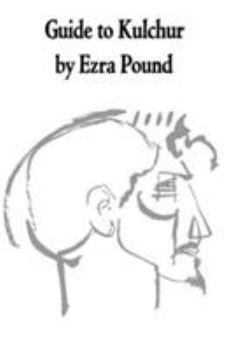Guide to Kulchur
Select Format
Select Condition 
Book Overview
Pound, Guide to Kulchur. an iconoclastic revision of culture.
Format:Paperback
Language:English
ISBN:0811201562
ISBN13:9780811201568
Release Date:January 1970
Publisher:New Directions Publishing Corporation
Length:384 Pages
Weight:0.93 lbs.
Dimensions:0.9" x 5.5" x 8.5"
Customer Reviews
1 rating
Apparently, Ol' Ezra Was Right
Published by Thriftbooks.com User , 15 years ago
For some reason, Ezra Pound looked about himself in the year of 1938 and thought that European culture was going to hell. His solution was to impotently rage against the coming of the night by publishing the screed, Kulchur (Ol' Ezra loved to spell words phonetically as he adopted the mask of Cranky Uncle Ez sitting on the front porch, chewingg tobaccy and dispensing cornpone). Kulchur has no internal coherence, as Ezra delightfully acknowledges: "[t]he hurried reader may say I write this in cypher and that my statement merely skips from one point to another without connection or sequence. The statement is nevertheless complete. All the elements are there, and the nastiest addict of crossword puzzles shd. be able to solve this or see this." Well, I don't know if we'd go that far. Instead, let's acknowledge that Ezra, while decidely one of the world's greatest cranks, was also a man of deep erudition and also a great artist. So this work, while scattershot, is filled to brim with insight from a skewed point of view that I, at least, find refreshing. Here's just one observation to demonstrate his wisdom: "The supreme crime in a critic is dullness. The supreme evil committable by a critic is to turn men away from the bright and the living. The ignominous failure of ANY critic (however low) is to fail to find something to arouse the appetite of his audience, to read, to see, to experience." Ezra was many things--quite a few of them execrable--but dullard he was not. Is this book difficult? Crackpot? Infuriating? Enlightening? You can find the answer in the last words of James Joyce's Ulysses.






